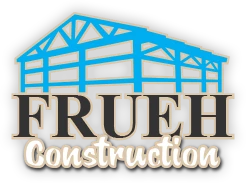
Concrete is one of the strongest building materials. Concrete’s strength, durability, and versatility make it a global building material. Concrete shapes modern sidewalks and buildings. Due to its various benefits, Frueh Construction is known for employing concrete. Let’s discuss concrete’s merits, affordability, and popularity as a building material. Call 701-693-5765 to learn more about our Napoleon, North Dakota firm.
Uses Of Concrete
Many construction projects involve the usage of concrete. It is frequently used to build the framework and foundations of homes. Concrete is solid and long-lasting for driveways and basements. Concrete is needed for commercial development in order to build offices, retail spaces, and warehouses. It’s great for these applications because of its strong load capacity and resistance to the environment. Because of concrete’s durability, roads, bridges, and dams can withstand weather and time.
Advantages of Concrete

Concrete has several advantages beyond structural strength. Durability is a major benefit. Concrete resists fire, rats, and weather, making it a durable building material. Concrete’s thermal bulk lowers interior temperatures and saves energy, especially in arid North Dakota. Its adaptability allows it to be used with numerous finishes and textures to match diverse architectural types and design sensibilities. Since concrete is recyclable, it has a lesser environmental impact. Saves money because it requires less maintenance during a structure’s life.
Types of Concrete by Frueh
We construct commercial, residential, and agricultural buildings at Frueh Construction. Concrete building has benefits for all of these sectors. Silos and barns in agriculture can withstand the rigors of concrete. Because it is resistant to chemicals and moisture, it can be used to store agricultural items and house animals. Robust concrete allows for large spans devoid of support columns in commercial buildings, increasing the amount of space that can be used by businesses. Concrete foundations give homes longevity and solidity, particularly in regions with harsh weather conditions like North Dakota.
What Affects the Price of Concrete Buildings?
The cost of building with concrete depends on a number of factors, all of which are significant. In order to budget and predict costs, contractors and clients need to be aware of these factors. The following factors influence the cost of concrete construction:
Complexity: Project scope and complexity have a significant impact on costs. Larger projects have higher costs since they require more labor, supplies, and machinery.
Materials: Price is influenced by cement, aggregates, additives, and reinforcing expenses. Variations in raw material, transportation, and availability may have an effect on project costs.
Machinery & Equipment: Finishing tools, pumps, forms, and concrete mixers raise project costs. Fuel, depreciation, upkeep, and equipment rental are all included in the price.
Design Complexity: Cost is influenced by both architecture and design complexity. Expensive materials and skilled labor may be required for complex patterns, creative finishes, unique textures, and unique forms. Custom details, molds, and formwork drive up project prices.
Get in touch with us right now!
All things considered, concrete is versatile, strong, and sustainable when used in building. It is employed in the building of infrastructure, homes, and businesses. Concrete is used by Frueh Construction, a company based in Napoleon, North Dakota, to construct sturdy structures. With the global construction industry changing, concrete continues to be a reliable foundation for constructing. Call us at 701-693-5765 to find out more about our concrete services.


